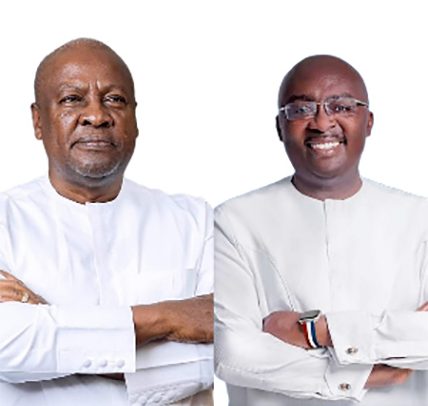John Dramani Mahama and Dr. Mahamudu Bawumia
The countdown to one of the most anticipated democratic events in the country’s history is almost over, as Saturday, December 7, marks the official polling day for Ghanaians to get a new president.
A total of 18,772,795 registered voters across the nation are set to cast their votes to elect the successor of President Nana Akufo-Addo and 276 legislators who will lead the country for the next four years.
Vice President Dr. Mahamudu Bawumia and former President John Dramani Mahama are the two leading candidates in contention to win the poll.
Candidate Bawumia
Dr. Bawumia, the 61-year-old presidential candidate for the New Patriotic Party (NPP), stands at a pivotal moment in the country’s political history. Having served as Vice President under Nana Akufo-Addo for the past eight years, Dr. Bawumia is vying to make history as the first Muslim president of the country.
As an Oxford-educated economist, the NPP presidential candidate is widely regarded for his financial expertise, a reputation he cemented during his tenure as a deputy governor of the Bank of Ghana.
His contributions to the country’s digital transformation and financial sector reforms have earned him praise as a forward-thinking leader.
However, his role in the management of the economy has drawn sharp criticism, as the country plunged into one of its most severe economic crises in decades.
Candidate Mahama
On the other hand, his close rival, Mr. Mahama, the 65-year-old flagbearer of the National Democratic Congress (NDC), is aiming for a political comeback in this year’s election.
Having served as an interim president in 2012, he won his own mandate in a presidential election that year.
However, his tenure was marred by persistent power outages, earning him the nickname “Mr. Dumsor.”
Despite losing the 2016 election to President Akufo-Addo, Mr. Mahama has returned to the political arena with a renewed vision, pledging an “urgent reset” for the nation.
Other Candidates
Beside the two key contenders, there are smaller political parties and independent candidates vying to make an impact, including businessman, Nana Kwame Bediako and Alan Kwadwo Kyerematen, the former Minister of Trade and Industry, who left the NPP last year after complaining that the presidential primaries were biased against him.
Victory Threshold
To secure victory in the presidential election during the first round, a candidate must obtain over 50% of the total votes cast. If no candidate achieves this majority, a run-off between the two candidates with the highest number of votes will be held by the end of December.
For the parliamentary elections, the first-past-the-post system is used, where the candidate receiving the most votes in each constituency wins, regardless of whether they surpass 50%.
Ninth Election
This year’s general election is the ninth edition since the introduction of multiparty democracy in 1992.
This year’s polls are expected to continue the tradition of peaceful polls, as Ghanaians head to the ballot box on December 7, 2024.
Last-Minute Push
The stakes are high, with political parties intensifying their campaigns in a last-minute push to sway undecided voters.
Today, whilst the ruling NPP will host a final rally at the University of Ghana Stadium, the main opposition party, the NDC, will have its final rally at Madina Zurak Park.
Big Issues
The December 7 elections are taking place amidst a challenging economic climate, but reform efforts are yielding results, according to the International Monetary Fund (IMF).
The Bretton Woods institution said the country had made significant progress in debt restructuring, with a rapid economic recovery, declining inflation (albeit at a slower pace), and improvements in fiscal and external positions.
Security Measures
The Electoral Commission (EC) has assured the public of its readiness to conduct free, fair, and transparent elections.
The EC announced that all electoral materials, including ballot papers and boxes have been distributed to polling centres nationwide under tight security.
In an effort to curb election-related violence, Ghana passed a bipartisan law in 2019 banning party-affiliated vigilante groups and imposing harsher penalties for offenders.
Yet, fears remain that this year’s elections could be particularly volatile due to heightened political tensions and a series of provocative developments.
‘Do-or-Die’ Contest
Both the NPP and the NDC have approached the elections with an uncompromising determination, framing the contest as a ‘do-or-die’ affair.
The NPP is particularly focused on breaking the eight-year political cycle, where power traditionally alternates between the two major parties.
Winning a third consecutive term would be unprecedented, and the party has conducted an aggressive campaign to achieve this goal.
The NDC, on the other hand, is gearing up for a critical showdown in the December 7 elections, determined to avoid a third consecutive term in opposition.
The party believes the current economic challenges and public dissatisfaction with the country’s trajectory have created favourable conditions for an NPP defeat.
With campaign messaging focused on economic recovery and governance reform, the party is confident that these factors will resonate with voters and pave the way for their return to power.
To ensure a peaceful process, the Ghana Police Service, in collaboration with other security agencies, has deployed personnel across the country.
The Inspector General of Police, Dr. George Akuffo Dampare, who heads the National Elections Security Taskforce, stated that security forces would remain professional while maintaining law and order.
“The security services are fully prepared to address any disruptions. We urge the public to cooperate with officials to ensure a smooth election,” he said.
A Call for Peace
Religious and civil society leaders have called on Ghanaians to uphold the nation’s long-standing reputation for peaceful elections.
The National Peace Council has launched campaigns urging political parties and their supporters to respect the outcomes of the polls.
As Saturday approaches, the eyes of the nation and the world are on Ghana. With its enviable track record of peaceful transitions, expectations are high for yet another successful electoral process that reflects the will of the people.
By Ernest Kofi Adu


